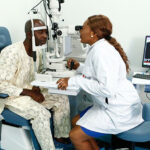With 75% of health costs paid out-of-pocket, Nigeria is betting on insurance expansion and stronger financing reforms to protect families from medical poverty.
Nigeria’s healthcare financing system places an overwhelming burden on households. Roughly 75% of health spending comes directly from individuals paying out of pocket. Global standards cap direct payments at 15–20% to ensure equitable access to care.
Despite its economic stature, Nigeria spends relatively little on health. Per capita health expenditure rose from around $67 in 2019 to roughly $91 in 2022. Meanwhile, government spending on health remains minimal: domestic government health expenditure accounted for only 4.22% of total health spending in 2021.
A recent report shows that less than 5% of Nigerians are benefiting from the National Health Insurance Scheme.
Nigeria’s population is estimated to be approximately 237.5 million by 2025, making it a total of 11.9 million beneficiaries. This chronic underfunding has left plenty of poor households vulnerable to financial shock from illness.
The federal government has announced plans to enrol 44 million Nigerians into the National Health Insurance Scheme (NHIS) by 2030, covering around 18.5% of the national population.
Meanwhile, officials are considering legislation to double the Basic Health Care Provision Fund from 1% to 2% of consolidated revenue to strengthen domestic health financing.
The BHCPF is Nigeria’s main tool for financing primary healthcare. It allocates at least 1% of the national revenue each year to provide free essential services for vulnerable groups, strengthen primary health centres, and supply medicines and vaccines, reducing the financial burden on citizens.
This announcement came during a four-day National Health Financing Policy Dialogue in Abuja, which brought together government officials, development partners, civil society, and private sector representatives.
The dialogue aims to develop actionable strategies for sustainable health financing through multi-stakeholder collaboration, improved transparency, and a shift away from aid dependency.
Does health insurance matter?
Health insurance works by sharing responsibility with the government: people contribute small amounts before sickness strikes, ensuring that when illness occurs, the financial burden doesn’t fall entirely on individuals.
By enrolling 44 million Nigerians, the government could significantly reduce the number of families pushed into poverty by medical expenses while encouraging earlier care-seeking and better health outcomes.
However, vastly expanding coverage requires deep financial commitment. Nigeria’s health budget has long fallen short of the 15% Abuja Declaration target, frequently staying around 4–5% of national budgets. Increasing the Basic Health Care Provision Fund to 2% of consolidated revenue is a positive step.
Beyond financing
The NHIS, initiated in 2005, has struggled with low enrollment, covering less than 5% of Nigerians, primarily those in the formal sector. The informal majority, and especially rural residents, remain largely unreached. Those who need it the most are rarely covered.
Even with adequate funding, Nigeria’s health system faces deeper obstacles: a brain drain of medical professionals, crumbling infrastructure, and inequitable distribution of services.
Many health facilities lack essential equipment, while doctors and nurses continue to leave the country in search of better opportunities. Addressing these issues is vital to ensure insurance translates into meaningful access to quality care.
Ghana’s NHIS now covers over 50% of its population despite sustainability challenges. While Nigeria struggles with attaining 18.5%, Rwanda has achieved near-universal coverage of 86.6% through community-based schemes and strong governance, with plans to have 100% coverage by 2030.
While Nigeria’s larger scale presents challenges, these examples demonstrate that significant progress is possible when political will, funding, and system reforms align.
Summary not available at this time.






